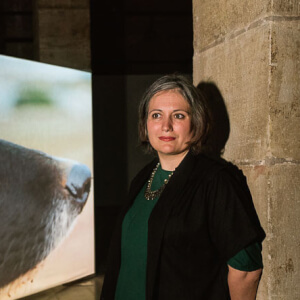This artist talk presents my artistic research that translates to the visual arts some features of the unclassifiable and fascinating work of Brasilian writer Clarice Lispector. Divided in two parts, the first one focuses on my encounter with Lispector’s, and the second presents and discusses my piece “A Pool of Light”.
Firstly, I unfold how for many years I experienced reading Lispector’s work like a kind of shelter. Her recurrent themes are the incapacity of language to reflect reality, the sacred character of the world, the need for loving it without giving it a meaning or trying to capture it, the mystery of creation, and also the female condition. These themes have also an oblique political and social dimension. Interestingly, I could not really grasp what happened to me however I felt comfort. She made me reconnect with something although I didn’t really know with what. It was more a reading closer to feeling than to intellectual understanding. My research showed that French Feminist scholar Hélène Cixous had a similar experience and for Cixous, Lispector’s literature is literature as philosophy that, importantly, has been written with the body.
Finally, I present my experimental and muti-layered work A Pool of Light - developed during a residency in The Collection, Lincoln, 2019- to examine how it activates Lispector’s literature. This work tackles the scenic condition of images through the recursive articulation of the images’ exhibition context with their own creation process. For this piece, I wanted to explore the boundaries between looking and being while I worked with the space. I discovered Lispector’s story ‘The Egg and the Hen’ where she notes that the transformation of reality and human relationships is a matter of placing the creation of poetic images in the unfolding boundaries of the true and the false, the inside and the outside, what we see and what sees us, what we touch and what touches us. A single standpoint is not enough, either the egg or the chicken. This allowed me to design a methodology capable of putting together the creative process, the work with the space through the installation, a performative work with different materials, and the projection of the images that were generated. This presentation concludes with an examination of how A Pool of Light is not a space of representation, but of enaction(1) in which there is a simultaneous emergence of the knower and the known, the one who sees and what is seen, subject and object; a space where a world is generated as an interwoven network of contingent positions and changing elements throughout a continuous process that allows an emergence of new meanings and a transformation of the old ones.
Notes:
(1) We can find here an inspiring coincidence between Lispector's short story and the concept of enaction as explained by Francisco Varela, precisely through the example of the egg and the chicken (Francisco J. Varela, Evan Thompson y Eleanor Rosch, The Embodied Mind: Cognitive Science and Human Experience, Cambridge, The MIT Press, 1993).
Back






